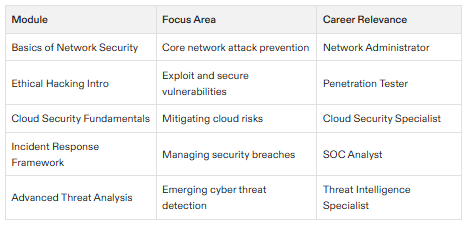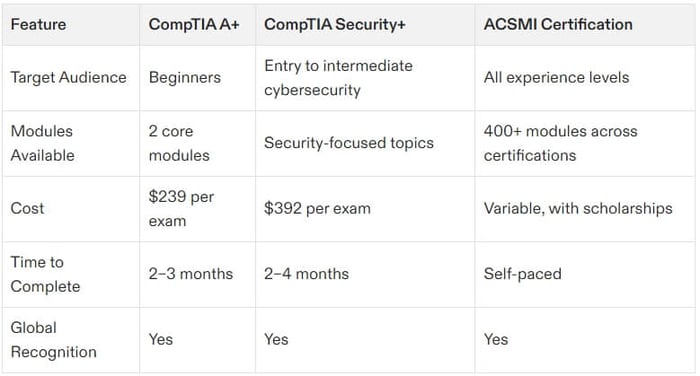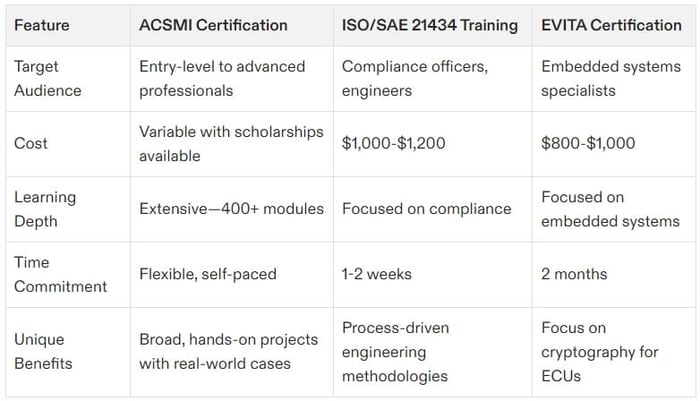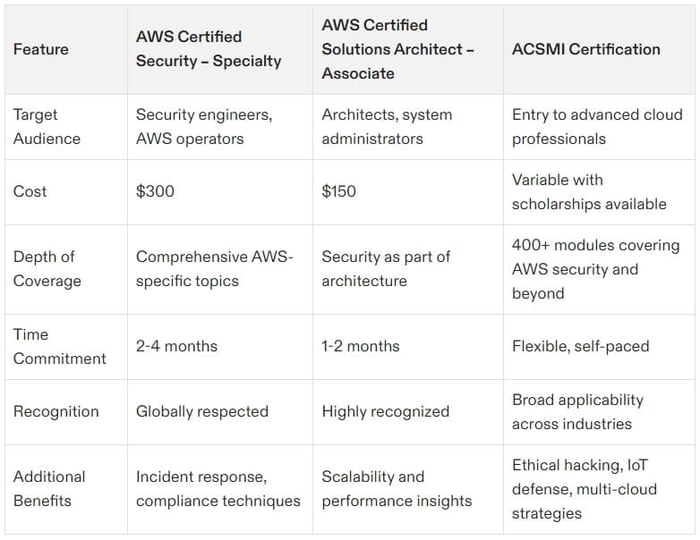Table of Contents
- Why Choose Cybersecurity Certification on Coursera?
- Top Certifications Available on Coursera
- How to Maximize Your Learning Experience
- ACSMI Certification with 400+ Modules
- Frequently Asked Questions (FAQs)
- 1. Is a cybersecurity certification on Coursera worth it?
- 2. Do I need prior experience to start a certification on Coursera?
- 3. What is the cost of a cybersecurity certification on Coursera?
- 4. Can I use Coursera certifications for job applications?
- 5. How can ACSMI complement my Coursera certifications?
- Final Thoughts
Cybersecurity is one of the most in-demand fields in today’s digital world. To remain competitive, professionals need certifications that prove their expertise and readiness to tackle evolving cybersecurity challenges. Opting for a cybersecurity certification on Coursera offers a flexible, affordable, and industry-relevant way to elevate your skills.
Why Choose Cybersecurity Certification on Coursera?
When it comes to online learning platforms, Coursera stands out for its vast selection of cybersecurity courses and certifications from top universities and industry leaders. Here’s why it’s an excellent option for aspiring and active cybersecurity professionals alike.
1. Accredited Courses
Coursera partners with prestigious institutions like Stanford University, the University of Toronto, and IBM. These partnerships ensure that all certifications are globally recognized and backed by industry standards.
2. Flexible Learning Schedule
One of the standout features of Coursera is its asynchronous learning format. Whether you’re working full-time, attending college, or juggling personal obligations, you can learn at your own pace.
3. Affordable Pricing
Unlike traditional classroom-based certifications, a cybersecurity certification on Coursera offers a cost-effective solution. Many programs also allow you to audit courses for free, providing access to knowledge even on a budget.
4. Accessible Practical Learning
Many certification programs integrate hands-on labs and assignments, simulating real-world cybersecurity scenarios. For more advanced, lab-based simulations, you can deepen your expertise with platforms like ACSMI, which specializes in practical cybersecurity training.
5. Industry-Relevant Skills
Courses on Coursera are curated to reflect the current needs and challenges of the cybersecurity field, preparing you for roles in ethical hacking, cloud security, compliance, and beyond.
Top Certifications Available on Coursera
Coursera offers a variety of pathways to jumpstart or accelerate your career. Here are some top certifications you can explore.
1. IBM Cybersecurity Analyst Professional Certificate
This program focuses on real-world scenarios like threat management and network protection, making it ideal for beginners.
- Key Skills: Threat intelligence, monitoring, and incident response.
- Duration: 4-6 months (part-time).
2. Google IT Support Professional Certificate
This introductory-level program includes cybersecurity fundamentals, providing a foundation for those new to IT.
- Key Skills: System administration, networking, and security essentials.
- Duration: 3-6 months.
3. Stanford Advanced Computer Security Certificate
Designed for professionals, this program delivers specialized knowledge in cryptography, network policy, and secure systems design.
- Key Skills: Encrypted communications, secure coding, and policy frameworks.
- Duration: 6-8 months.
4. University of Illinois Cybersecurity Specialization
Focusing on core cybersecurity principles, this series combines theory with practical applications to bridge the knowledge gap.
- Key Skills: Risk assessment, penetration testing, and governance.
- Duration: 6 months.
Each of these certifications can serve as stepping stones in your cybersecurity career. Combining them with platforms like ACSMI for advanced hands-on learning enables you to transition quickly into industry roles.
How to Maximize Your Learning Experience
Earning a cybersecurity certification on Coursera is an investment in your career, and maximizing that investment means adopting smart learning strategies. Here’s how to get the most out of your certification experience while building skills that truly matter.
1. Set Clear Career Goals
Before jumping into a course, take some time to define your career aspirations. Are you aiming to become a penetration tester, focus on cloud security, or lead compliance efforts? Identifying your target role will help you choose the right certification and learning pathway. For example, ethical hacking enthusiasts can pursue beginner programs such as the IBM Cybersecurity Analyst Professional Certificate before progressing to advanced certifications. Knowing where you want to go provides clarity and minimizes wasted efforts on irrelevant courses.
2. Supplement Learning with Virtual Labs
While Coursera offers excellent theoretical knowledge, hands-on skills are essential in cybersecurity. Make use of resources like virtual labs to apply what you learn in real-world situations. Platforms like ACSMI offer over 400 modules, providing immersive experiences in ethical hacking, advanced threat detection, incident response, and more. Practicing in these labs allows you to cement concepts and stand out to employers who value practical, job-ready skills.
3. Leverage Coursera's Career Resources
Many certifications on Coursera include a suite of career-focused tools. These features, such as resume-building services, mock interview sessions, and job placement support, can play a vital role in translating learning into tangible career growth. Some programs even connect learners with hiring partners, giving you a direct edge in the job market. Make sure to fully explore and utilize these resources—they can be the difference between certification completion and career advancement.
4. Commit to Consistency
The flexibility of a cybersecurity certification on Coursera is one of its most attractive features, but it also requires discipline. Plan your study schedule and stick to it. Dedicate regular intervals—be it daily or weekly—to learning modules, completing assignments, and revising concepts. A steady pace ensures you retain knowledge better and avoid last-minute cramming. Break your sessions into manageable chunks to stay focused and productive, even with a busy schedule.
5. Engage with the Cybersecurity Community
Learning alone can be effective, but engaging with a larger community enhances your experience. Join forums, online study groups, and LinkedIn communities focused on cybersecurity. These spaces allow you to exchange ideas, discuss complex topics, and even gain insights into job opportunities. Networking with peers and professionals not only keeps you motivated but also helps you stay updated on industry trends and emerging technologies.
ACSMI Certification with 400+ Modules
Frequently Asked Questions (FAQs)
1. Is a cybersecurity certification on Coursera worth it?
Absolutely. Coursera certifications are recognized globally, provide flexible learning options, and often include practical labs to enhance skill application.
2. Do I need prior experience to start a certification on Coursera?
Many beginner-friendly programs, like the IBM Cybersecurity Analyst Professional Certificate, are designed for those without any prior experience.
3. What is the cost of a cybersecurity certification on Coursera?
Costs vary but typically range between $39 and $99 per month for professional certificates. Some specialized programs may cost more but offer financial aid.
4. Can I use Coursera certifications for job applications?
Yes, Coursera certifications are industry-recognized and highly regarded by employers. Adding them to your resume or LinkedIn profile can significantly boost your credibility.
5. How can ACSMI complement my Coursera certifications?
ACSMI provides 400+ advanced cybersecurity modules that offer in-depth practical training, filling the gap for hands-on experience that many Coursera programs may not fully address.
Final Thoughts
A cybersecurity certification on Coursera is a game-changing opportunity for aspiring and seasoned professionals alike. With its quality courses, flexible schedules, and affordability, Coursera empowers you to strengthen your cybersecurity credentials while maintaining your life balance.
Augment your learning by exploring tools like ACSMI, which provide extensive hands-on modules and simulate real-world cybersecurity challenges. Whether you’re laying the groundwork or advancing into niche areas, the right certification strategy can unlock new career opportunities in a thriving industry. Take the first step toward becoming a cybersecurity expert today!





